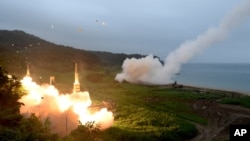South Korea said Tuesday it has reached an agreement with the United States that will allow it to use solid rocket fuel for space vehicles, a change that will enable the country to launch its first military surveillance satellites and develop the technology to build more powerful missiles.
The agreement lifts guidelines Seoul first signed onto with Washington in 1979. The U.S. had imposed restrictions out of concern solid fuel could lead to bigger rockets and a regional arms race.
The guidelines were last revised in 2017 to scrap a payload cap of 500 kilograms for South Korea's ballistic missiles with ranges of 800 kilometers.
But at a Seoul news conference, South Korean Deputy National Security Adviser Kim Hyun-chong announced the U.S. and South Korea agreed to lift those restriction.
Kim said, effective immediately, all South Korean companies, research institutes and nationals will be free to research, develop, produce and own not only liquid fuel but also solid fuel and various types of hybrid space rockets, without any restrictions.
Solid fuel is less expensive, offers greater mobility for missiles and rockets and reduces launch preparation time.
Kim said the revised agreement still bars South Korea from having a missile with a range of more than 800 kilometers but added Seoul could discuss altering that restriction with Washington if that's needed for South Korean national security.
Kim said South Korea could use solid fuel-based rockets to launch military reconnaissance satellites. South Korea currently has no spy satellites.
South Korea's missile capability is inferior to that of rival North Korea. In 2017, North Korea carried out three intercontinental ballistic missile tests as part of its stated efforts to build a nuclear-tipped missile capable of reaching the U.S. mainland.





